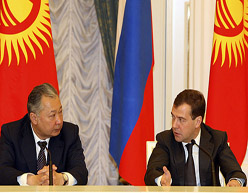Kremlin rejects link between financial aid and Bishkek's decision to close a U.S. military base

MOSCOW, Russia – Russian Foreign Affairs Ministry has denied any connection between the granting of financial aid to Kyrgyzstan and the Central Asian state’s decision to close a military base, strategically vital the ongoing U.S. anti-terrorist operations in Afghanistan.
Russia has recently offered a $2bln-aid package to Bishkek to help it battle the current global crisis and the negative impacts on its social and economic life. “We don’t think these two events are anywhere connected. The decision to close the base was based on a resolution taken by the Kyrgyz government. That was a sovereign and very well thought over decision of the Kyrgyz leader,” Grigory Karasin, Russia’s deputy foreign affairs minister, said. “Russia and Kyrgyzstan are very close countries that cooperate in different spheres, and the granting of this aid package is the end result of many months of work by our ministries,” he added. “We were able to offer Kyrgyzstan financial aid that will probably help it to go through the most critical phase of this crisis.”
The Russian Foreign Affairs Ministry’s statement followed a series of speculations in leading western media tying the closure of the base by Kyrgyz President Kurmanbek Bakiev, who announced the decision at a press conference on a visit to Moscow on February. The Manas base was opened in Kyrgyzstan by the United States following the UN mandate to combat the Taliban government in Afghanistan, following the terrorist attacks on U.S. cities of New York, Pennsylvania and Pentagon in Washington 2001.
Adakhan Madumarov, secretary of the Kyrgyz Security Council, has said the U.S. military would be given 180 days to close its operations and vacate the premises after formal diplomatic formalities. Observers says the decision by the Central Asian state, a former Soviet republic and a traditional Russian ally, poses a serious challenge to U.S. President Barack Obama, whose administration plans to boost its military contingent fighting the rising Taliban resurgence and resistance in Afghanistan.
The U.S. State Department said it had still not been informed officially of the decision. "We have seen many statements in the media but have not received any notification through the appropriate diplomatic channels on this," U.S. State Department spokesman Gordon Duguid said.












 Web design,
Web design,